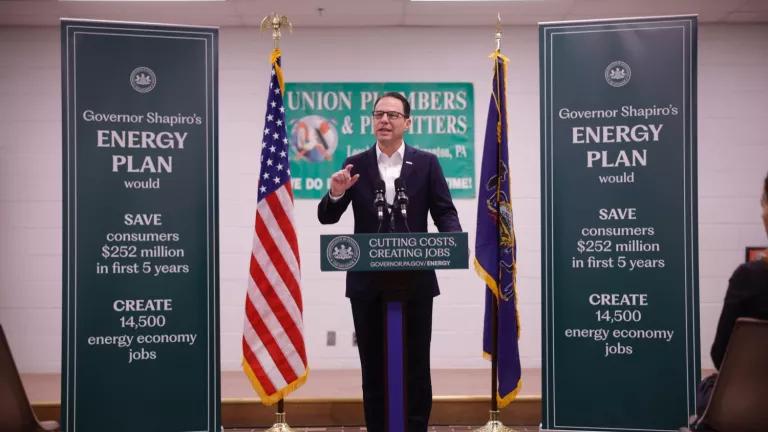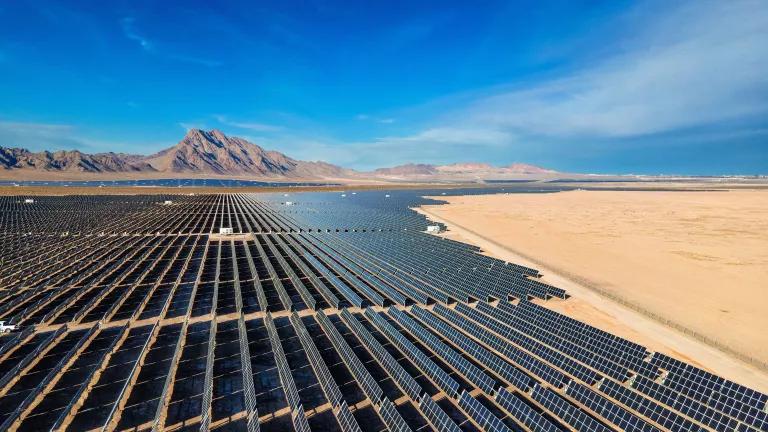In the breakthrough climate agreement reached in Paris December 12th, at least 186 countries have committed to start curbing the carbon pollution that's driving dangerous climate change. For the first time, all the world's biggest emitters - including the United States, China, Europe, and India - have agreed to cut their carbon pollution, speed their transition to cleaner energy, and strengthen their actions over time. (Read NRDC President Rhea Suh's statement and NRDC's top-line summary of the Paris Agreement.)
Under President Obama, the U.S. has embraced the Paris agreement and is already implementing a robust Climate Action Plan at home. Critics claim the president can't commit our country to Paris, or take these domestic actions, without getting the current Congress's approval. They are wrong on both counts.
Can the president make the U.S. a party to the Paris agreement?
Article 4 of the Paris agreement provides that "Each Party shall prepare, communicate and maintain successive nationally determined contributions that it intends to achieve. Parties shall pursue domestic mitigation measures with the aim of achieving the objectives of such contributions." Article 4 also provides for parties to update their national contributions every five years, with the expectation that each one will represent a progression over the one before. Does the Senate have to consent before the U.S. can become a party to these provisions?
No. Article 4 of the Paris agreement doesn't create a new international legal obligation. It reiterates the obligations already contained in Article 4 of the 1992 United Nations Framework Convention on Climate Change. The United States became a party to the Framework Convention after the Senate gave its advice and consent by an overwhelming vote in 1992. That's why legal experts say a new round of Senate advice and consent is not needed. (See here and here.)
Article 4 of the Framework Convention obligates the U.S. and every other party to "formulate, implement, publish and regularly update national ... programmes containing measures to mitigate climate change by addressing anthropogenic emissions by sources and removals by sinks of all greenhouse gases." The U.S. has been reporting periodically on its national program and its mitigation measures for nearly two decades. What's required under Article 3 of the Paris agreement is squarely within the obligations we already assumed under the Framework Convention.
Leading up to the Paris conference, the U.S. announced its "Intended Nationally Determined Contribution" (INDC), which commits to achieve a 26 to 28 percent reduction in our greenhouse gas emissions by 2025, from 2005 levels. Our national contribution, and 185 others, are included in the Paris agreement. Under the agreement, countries will pursue their national emission reduction commitments through domestic measures. Countries are required to report on their actions and their progress, but this is an obligation the Senate already approved in 1992.
The same is true on adaptation, finance, and other aspects of the Paris agreement. The commitments the U.S. is making in the Paris agreement fall within the international legal obligations that the Senate consented to under the Framework Convention. The Paris agreement states that the developed countries intend to continue mobilizing a combination of public and private sector funds to help developing countries curb their emissions and to avoid or recover from climate change impacts. But the agreement does not create new international funding obligations beyond those in the Framework Convention. To be sure, Congress has to appropriate public funds that the U.S. contributes to these purposes. While some members of Congress want to block climate funding, they haven't had the votes. For instance, a bill to block contributions to the Green Climate Fund failed in a key Senate committee earlier this year.
In short, what's called for by the Paris agreement doesn't create new international legal obligations. So the president doesn't need a new round of Senate advice and consent before the U.S. can become a party to Paris.
Does the president need new laws before he can take steps to reduce U.S. carbon pollution?
No. All the actions to cut carbon pollution in the Climate Action Plan are authorized under laws already on the books - under laws that Congress already passed. The Clean Air Act, for example, gives the Environmental Protection Agency the authority and responsibility to set standards to curb carbon pollution from cars and trucks, power plants, and many other sources. The U.S. Supreme Court has upheld EPA's Clean Air Act authority over carbon pollution three times in the last eight years. The clean car and fuel economy standards, for example, will halve new cars' carbon pollution and double their mileage by 2025, compared to 2010 models. The Clean Power Plan will cut carbon pollution from our power plants by nearly a third by 2030, from 2005 levels. The EPA is setting Clean Air Act standards to cut methane leakage from the oil and gas sector and hydrofluorocarbons use in refrigerators and air conditioners. The Energy Department is setting energy efficiency standards for appliances, lighting, heating and cooling systems, and other equipment under our existing energy laws.
In short, every domestic action the president has promised to take is already authorized by existing laws. Some in the current Congress wish they could repeal these laws and block these actions. But they lack the votes. The Climate Action Plan stands on firm ground.
Thus, Congress does not need to sign off on the Paris agreement or the Climate Action Plan. The president is acting well within his legal authority.




